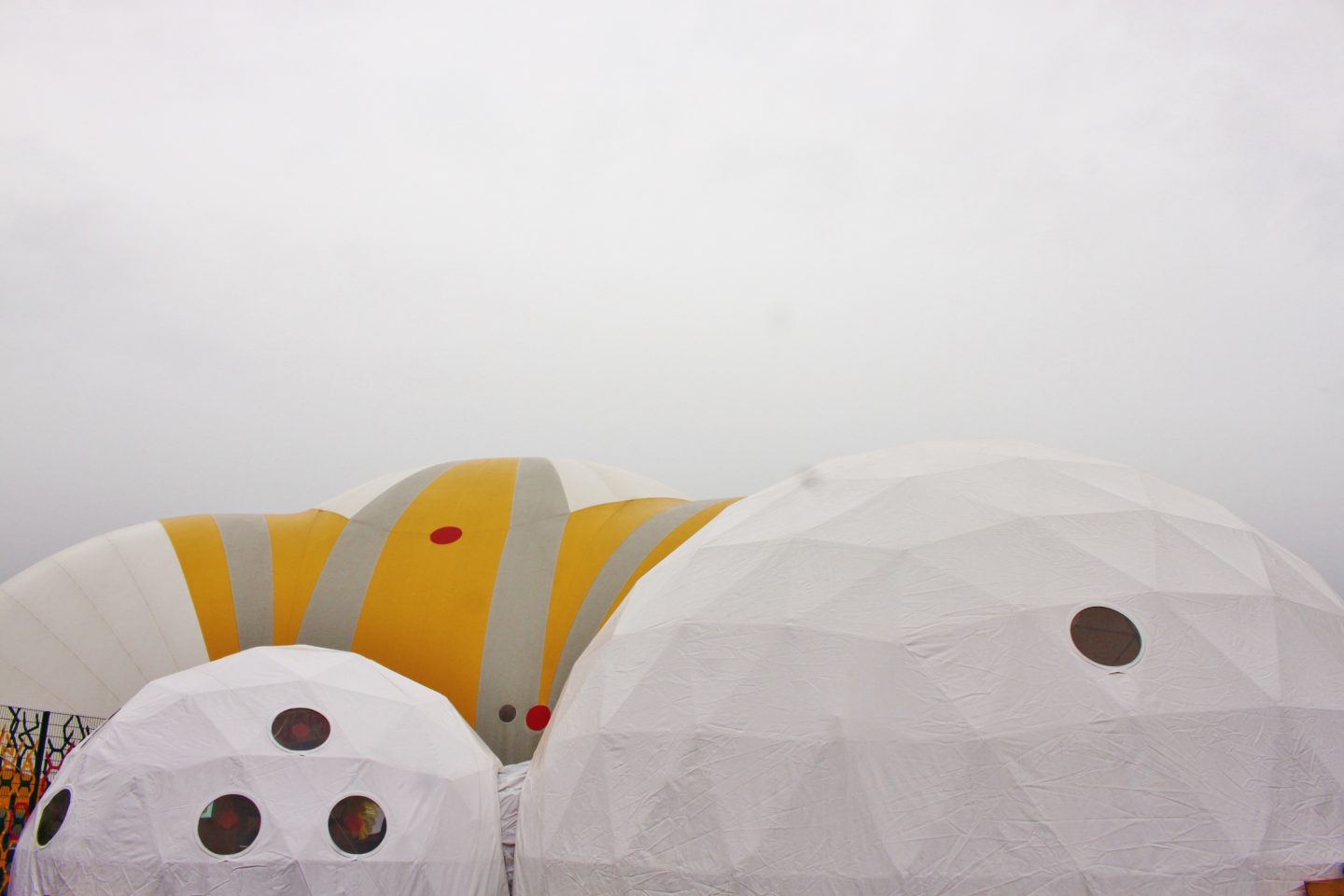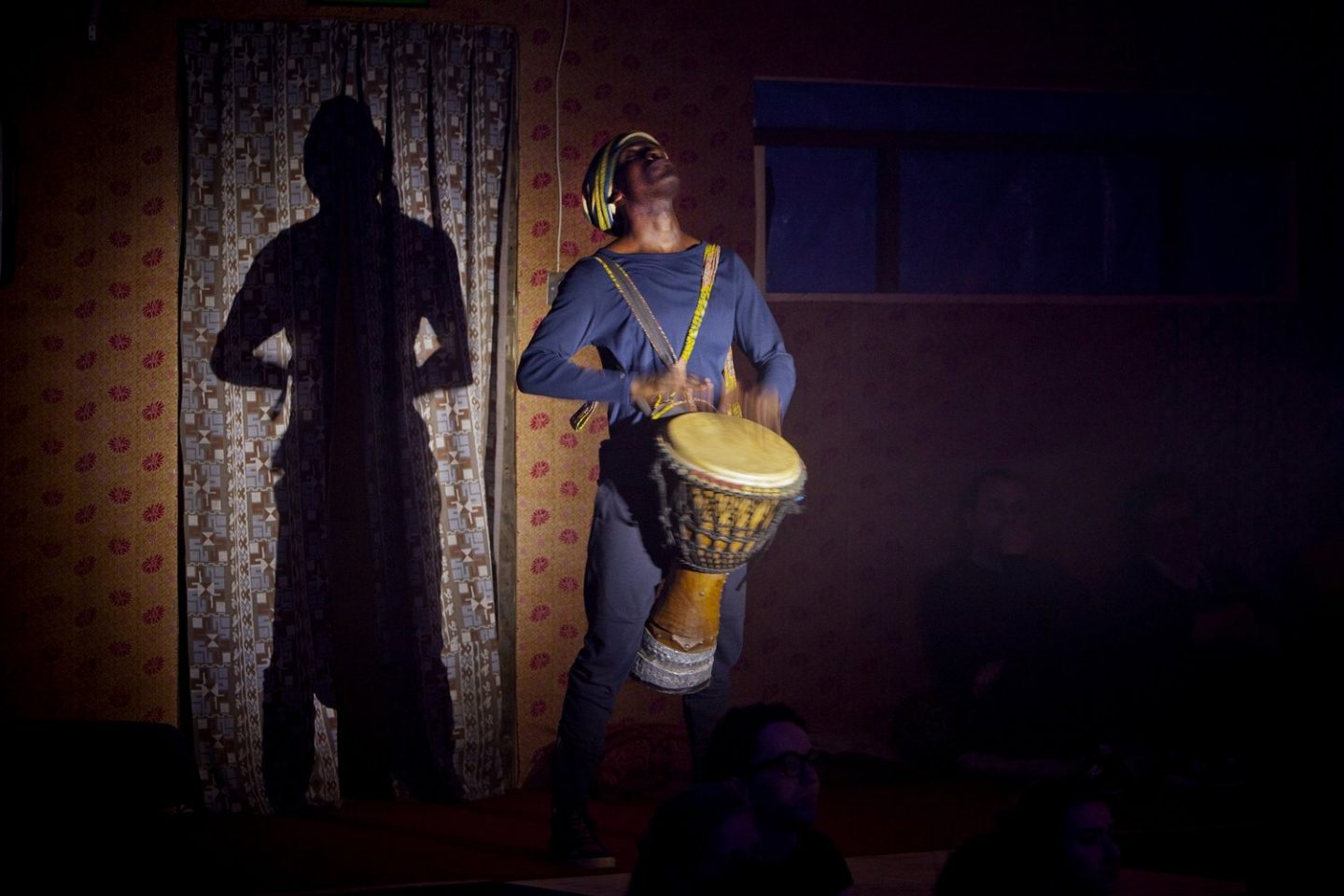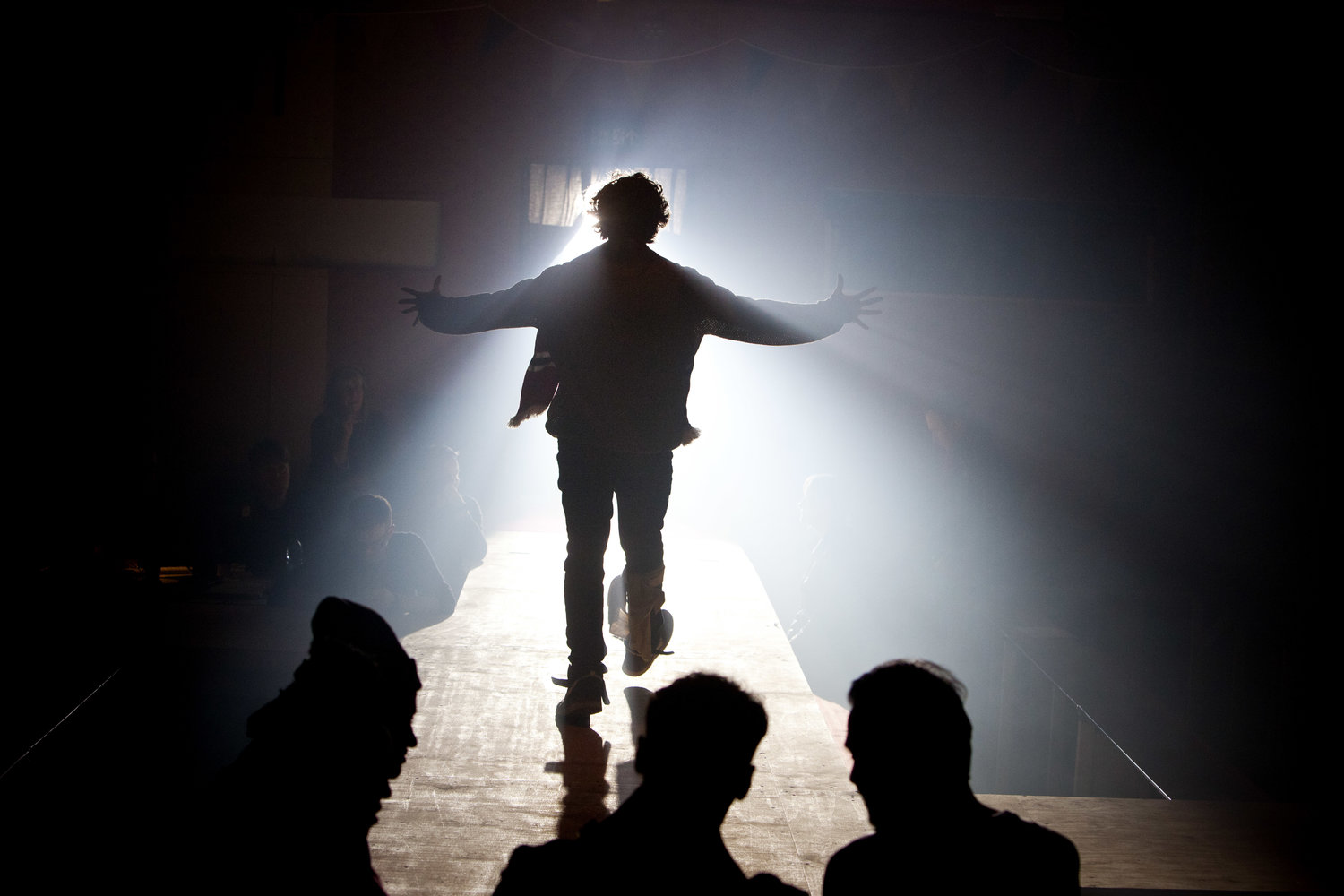Photo courtesy of Good Chance Theatre from The Jungle at the Young Vic. Photographer David Sandison.
STORY BY HÉLÈNE SCHWITZER-BORGIALLO
ENGLISH TRANSLATION BY KAMI L. RICE
Mettre sa créativité au service de la rencontre des cultures : voilà l’objectif du duo de dramaturges anglais dont nous parle cette semaine Hélène Schwitzer-Borgiallo, enseignante à l’Université Paris 8.
French academic Hélène Schwitzer-Borgiallo reports for us this week on innovative projects undertaken by a duo of English playwrights who are bringing together groups of people who don’t normally get to meet each other.
Les cris, les rumeurs, l’agitation : la Jungle va-t-elle vraiment être évacuée ? Va-t-il falloir de nouveau fuir, se cacher, reconstruire… ailleurs ?
Confortablement installée sur mon coussin aux motifs orientaux, dans ce théâtre londonien transformé en restaurant de fortune, j’observe les comédiens nous faire revivre le chaos ressenti par les migrants et bénévoles à l’annonce du démantèlement du camp de Calais en septembre 2016.
Dès cette scène d’ouverture, l’immersion est totale, alors que les acteurs jaillissent de toute part, s’aidant de lampes torches pour circuler dans l’obscurité à quelques centimètres du public, s’interpellant à travers la salle en essayant de couvrir le son lancinant des sirènes de police.
Cette expérience saisissante constitue le prélude d’un voyage aux origines du campement, surnommé « la Jungle » par ses habitants, où se sont rassemblés pendant plus de quinze ans des milliers de migrants cherchant à gagner le Royaume-Uni.
Depuis l’installation des premières tentes jusqu’à la construction d’une école, d’une église et même d’un restaurant, le spectateur assiste à l’évolution du camp au fil des mois. On y rencontre une série de personnages, à la fois représentatifs de leur condition et délicatement uniques.
Il y a d’abord le narrateur, Salfi, un jeune Syrien ayant dû interrompre ses études de littérature, puis Salar, le cuisinier afghan qui nous reçoit fièrement dans son restaurant, distribuant avec autant de générosité ses pains Nan que ses opinions. Son protégé, Norullah, est un jeune adolescent plein de fougue à l’idée de se bâtir une nouvelle vie de l’autre côté de la Manche. Okot, 17 ans, vient du Soudan et nous raconte, avec pudeur et gravité, les épreuves ayant laissé maintes cicatrices sur son torse comme sur son âme.
A ce groupe de migrants s’ajoutent divers bénévoles britanniques, chacun mû par ses convictions personnelles et confronté à ses propres contradictions.
Leurs destins vont se croiser, se heurter, s’unir. Au milieu de la survie, la vie émerge.
The Jungle, une pièce écrite par Joe Murphy et Joe Robertson, deux jeunes artistes anglais, est une évocation puissante de la complexité des enjeux humains et politiques entourant la question des réfugiés. S’inspirant de leur expérience à Calais, les dramaturges nous livrent également un hymne à la dignité irréductible de chaque être humain, qui jaillit même dans les conditions les plus extrêmes.

Jouée pour la première fois en décembre 2017 au Young Vic de Londres, The Jungle s’insère dans un projet créé en 2015 par ce même duo : Good Chance Theatre. Les deux artistes avaient alors décidé de réagir à la crise des réfugiés en installant à Calais un espace de création pour les migrants. Partant du principe que l’expression est un droit fondamental, ils avaient transformé ce dôme en lieu d’échange, où se côtoyaient tous les arts et où chaque participant pouvait s’exprimer librement. Le nom de l’association, « Good Chance », reprend l’expression utilisée par les migrants pour désigner les jours les plus propices au passage vers le Royaume-Uni.
Suite au démantèlement de la Jungle en octobre 2016, ce théâtre itinérant s’est installé une dizaine de jours à Londres en 2016 puis à Paris au printemps 2017.
L’expérience parisienne a été renouvelée de janvier à mars 2018 au sein du centre de réfugiés La Bulle, géré par l’association Emmaüs Solidarité. Pendant trois mois, divers ateliers artistiques ont été proposés aux réfugiés : théâtre, danse, chant, peinture, poterie, réalisation de masques, confection de costumes… une véritable explosion de créativité ! Chaque semaine s’est conclue par un spectacle festif et participatif appelé « Hope Show ». Ouverte au public, cette représentation permettait aux participants de montrer leurs travaux et de partager leur cheminement dans une ambiance conviviale. Cette aventure s’est terminée le 31 mars, le gouvernement français ayant choisi de remplacer La Bulle par cinq centres d’accueil situés en région parisienne.
Mais pour l’équipe de Good Chance, le voyage continue, à la recherche d’un nouveau lieu où raviver, avec d’autres, la fragile flamme de la dignité humaine.
Shouts, rumors, unrest! Is the Jungle really going to be evacuated? Is it going to be necessary to flee again, to hide, to rebuild…somewhere else?
Comfortably seated on an oriental cushion in this London theatre transformed into a makeshift restaurant, I watch the actors recreating for us the chaos felt by the migrants and volunteers when the dismantling of the refugee encampment in Calais, France, was announced in September 2016.
From this opening scene, immersion is total, with actors appearing all around us, using flashlights to move in obscurity a few centimeters from the audience, calling out to each other across the room trying to be heard over the sound throbbing from police sirens.
This gripping experience constitutes the introduction of a theatrical voyage into the origins of the encampment nicknamed “the Jungle” by its inhabitants, a place where for more than 15 years thousands of migrants hoping to reach the U.K. collected in various iterations of “the Jungle.”
From the setting up of the first tents to the construction of a school, a church, and even a restaurant, audience members witness the camp’s evolution over the months. They meet a series of characters who are at the same time typical of their situations but also exquisitely unique.

First there is the narrator, Salfi, a young Syrian man who had to interrupt his studies in literature. Then there is Salar, an Afghan cook who welcomes us proudly to his restaurant, giving out his naan bread as generously as his opinions. His protégé, Norullah, is a young teenager full of excitement over the idea of building a new life for himself on the other side of the English Channel. Okot, 17 years old, comes from Sudan and tells us, with reticence and solemnity, of the hardships that left numerous scars on his torso as well as on his soul.
To this group of migrants are added various British volunteers, each moved by his or her personal convictions and confronted with his or her own inconsistencies.
The fates of all of these people are going to meet, collide, and then unite. In the middle of survival, life emerges.
The Jungle, a play written by Joe Murphy and Joe Robertson, two young English artists, is a powerful evocation of the complexity of the human and political stakes surrounding the refugee question. Inspired by their experience in Calais, the playwrights also give us through their play a hymn to the irreducible dignity of each human being, a dignity that springs forth even in the most extreme conditions.
Performed for the first time in December 2017 at the Young Vic theatre in London, The Jungle is connected to a project created in 2015 by this same pair of playwrights: Good Chance Theatre. The two artists decided to react to the refugee crisis by setting up a space for creativity and creation for migrants in Calais. Believing that expression is a fundamental right, Good Chance Theatre purchased a large geodesic dome in which to create a place of exchange, a nomadic theatre, where the arts could rub shoulders with each other and where each participant could express himself or herself freely. The name of the organization, “Good Chance,” comes from the expression used by the migrants in Calais to indicate the most promising days for gaining passage to the U.K.
Following the dismantling of the Jungle in October 2016, the mobile theatre set up in London for around ten days in 2016 and then in Paris in spring 2017.
The Parisian version was repeated from January to March 2018 at La Bulle refugee welcome center which was managed by the organization Emmaüs Solidarité. For three months at La Bulle, various artistic workshops were offered to the refugees: theatre, dance, singing, painting, pottery, creation of masks, costume fabrication—an explosion of creativity! Each week concluded with a festive, interactive performance called “Hope Show.” Open to the public, this show allowed participants to show off their work and to share their progress in a friendly atmosphere. This adventure ended on March 31 because the French government decided to replace La Bulle with five welcome centers located around the Paris region.
But for the Good Chance team, the journey continues with the search for new places where they, with others, can kindle the fragile flame of human dignity.
Hélène Schwitzer-Borgiallo enseigne l’anglais aux étudiants des filières artistiques de l’Université de Paris 8 Vincennes-Saint-Denis. Agrégée d’anglais, elle a également été lectrice de français à l’Université d’Édimbourg avant d’obtenir en 2015 son doctorat d’anglais à l’Université d’Aix-Marseille. Sa thèse, qui portait sur le « Théâtre pour le Développement » dans l’Afrique du Sud contemporaine, reflète sa passion pour les liens entre art et société.
Hélène Schwitzer-Borgiallo teaches English to students majoring in the arts at the University of Paris 8 Vincennes-Saint-Denis. She holds the competitive French agrégation for English and was a lecturer in French at the University of Edinburgh before earning her doctorate in English in 2015 from the University of Aix-Marseille. Her dissertation on theatre for development in contemporary South Africa reflects her passionate interest in the links between art and society.

